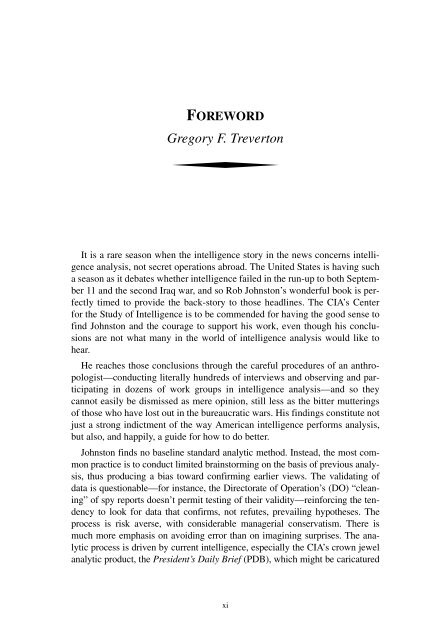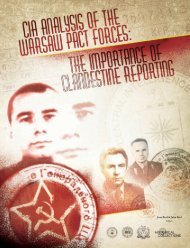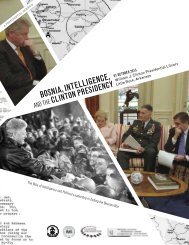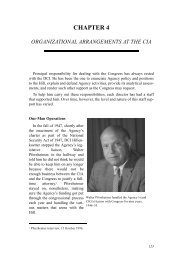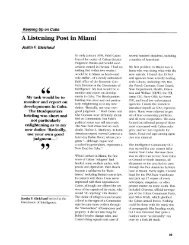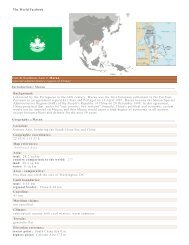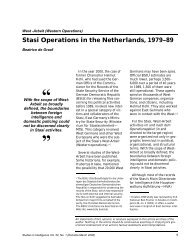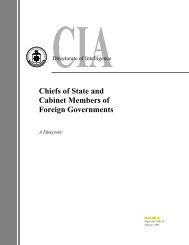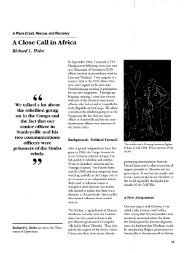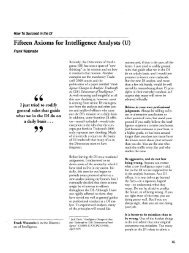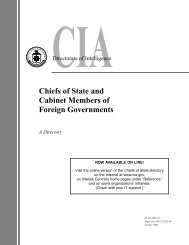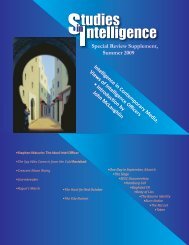Analytic Culture in the U.S. Intelligence Community (PDF) - CIA
Analytic Culture in the U.S. Intelligence Community (PDF) - CIA
Analytic Culture in the U.S. Intelligence Community (PDF) - CIA
You also want an ePaper? Increase the reach of your titles
YUMPU automatically turns print PDFs into web optimized ePapers that Google loves.
FOREWORD<br />
Gregory F. Treverton<br />
It is a rare season when <strong>the</strong> <strong>in</strong>telligence story <strong>in</strong> <strong>the</strong> news concerns <strong>in</strong>telligence<br />
analysis, not secret operations abroad. The United States is hav<strong>in</strong>g such<br />
a season as it debates whe<strong>the</strong>r <strong>in</strong>telligence failed <strong>in</strong> <strong>the</strong> run-up to both September<br />
11 and <strong>the</strong> second Iraq war, and so Rob Johnston’s wonderful book is perfectly<br />
timed to provide <strong>the</strong> back-story to those headl<strong>in</strong>es. The <strong>CIA</strong>’s Center<br />
for <strong>the</strong> Study of <strong>Intelligence</strong> is to be commended for hav<strong>in</strong>g <strong>the</strong> good sense to<br />
f<strong>in</strong>d Johnston and <strong>the</strong> courage to support his work, even though his conclusions<br />
are not what many <strong>in</strong> <strong>the</strong> world of <strong>in</strong>telligence analysis would like to<br />
hear.<br />
He reaches those conclusions through <strong>the</strong> careful procedures of an anthropologist—conduct<strong>in</strong>g<br />
literally hundreds of <strong>in</strong>terviews and observ<strong>in</strong>g and participat<strong>in</strong>g<br />
<strong>in</strong> dozens of work groups <strong>in</strong> <strong>in</strong>telligence analysis—and so <strong>the</strong>y<br />
cannot easily be dismissed as mere op<strong>in</strong>ion, still less as <strong>the</strong> bitter mutter<strong>in</strong>gs<br />
of those who have lost out <strong>in</strong> <strong>the</strong> bureaucratic wars. His f<strong>in</strong>d<strong>in</strong>gs constitute not<br />
just a strong <strong>in</strong>dictment of <strong>the</strong> way American <strong>in</strong>telligence performs analysis,<br />
but also, and happily, a guide for how to do better.<br />
Johnston f<strong>in</strong>ds no basel<strong>in</strong>e standard analytic method. Instead, <strong>the</strong> most common<br />
practice is to conduct limited bra<strong>in</strong>storm<strong>in</strong>g on <strong>the</strong> basis of previous analysis,<br />
thus produc<strong>in</strong>g a bias toward confirm<strong>in</strong>g earlier views. The validat<strong>in</strong>g of<br />
data is questionable—for <strong>in</strong>stance, <strong>the</strong> Directorate of Operation’s (DO) “clean<strong>in</strong>g”<br />
of spy reports doesn’t permit test<strong>in</strong>g of <strong>the</strong>ir validity—re<strong>in</strong>forc<strong>in</strong>g <strong>the</strong> tendency<br />
to look for data that confirms, not refutes, prevail<strong>in</strong>g hypo<strong>the</strong>ses. The<br />
process is risk averse, with considerable managerial conservatism. There is<br />
much more emphasis on avoid<strong>in</strong>g error than on imag<strong>in</strong><strong>in</strong>g surprises. The analytic<br />
process is driven by current <strong>in</strong>telligence, especially <strong>the</strong> <strong>CIA</strong>’s crown jewel<br />
analytic product, <strong>the</strong> President’s Daily Brief (PDB), which might be caricatured<br />
xi


